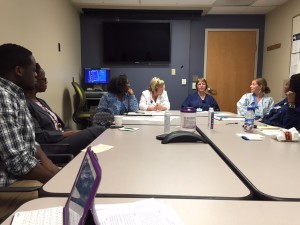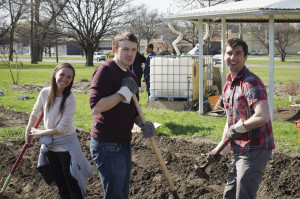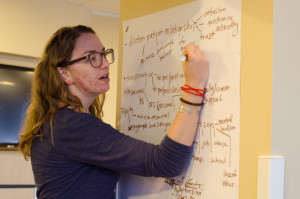This blog was written by current fellows & project coordination leads for this challenge, Brittany Stallworth and Liz Venatta.
How can one tackle the issues of health disparities? How can health care providers better understand the communities they are serving in Detroit? How does one overcome issues of lack of transportation and literacy gaps as they relate to access to health care?
The Health Disparities Coalition, a working group designed with two major health systems (Beaumont Health System- Family Medicine and Henry Ford Health System-Institute of Multicultural Health), two local medical schools (Wayne State University School of Medicine and Oakland University William Beaumont School of Medicine) and a Detroit non-profit (Healthy Detroit) partnered with the third year Challenge Detroit fellows in order to answer some of these questions.
The systems and organizations that are part of this coalition are at the forefront of addressing health disparities in the city of Detroit. The social determinants of health are the circumstances in which people are born, grow up, live, work and age, and the systems put in place to deal with illness. Economics, social policies and politics often influence these circumstances even further and often create gaps in the way health care is provided.
The fellows divided into the following teams in order to shed light on a breadth of health issues and the social determinants related to them:
- Mental Health
- Geriatrics
- Wellness
- Infant Mortality
- Primary Care vs. Specialist Care
- A video creation team
 To truly grasp the deep impact health disparities have had on Detroit, the fellows engaged in various empathy activities and volunteer opportunities. By taking on personas similar to Detroit residents, the fellows were able to see, firsthand, just how much room there is for improved access to quality health care. They got a glimpse into how taking public transportation might make attending multiple doctors’ visits difficult, and how language and literacy barriers may prevent positive health outcomes.
To truly grasp the deep impact health disparities have had on Detroit, the fellows engaged in various empathy activities and volunteer opportunities. By taking on personas similar to Detroit residents, the fellows were able to see, firsthand, just how much room there is for improved access to quality health care. They got a glimpse into how taking public transportation might make attending multiple doctors’ visits difficult, and how language and literacy barriers may prevent positive health outcomes.
Allowing the knowledge gained from the empathy experiences to guide their innovation, the fellows developed solutions that could be integrated into a medical education curriculum during the course of five weeks. In order to tackle health disparities in a direct fashion, Challenge Detroit and the Health Disparities Coalition recognized the importance of educating those who are becoming health care providers about the disparities that face many of the patients they will interact with.  The fellows also participated in a volunteer opportunity at the Farwell Community Garden by helping to prepare the soil and land for planting for the year.
The fellows also participated in a volunteer opportunity at the Farwell Community Garden by helping to prepare the soil and land for planting for the year.
These experiences allowed fellows to better create materials that can be used in medical schools and residency programs to raise awareness about disparities in health care. These materials included incentive-based programs for residents to participate in community health and proposed infrastructure for the creation of neighborhood meetings that health care providers can attend and meet their patients closer to their homes. Further, the fellows created a video that can be used to give a captivating introduction to the health disparities that face urban communities like Detroit.
 All of the work the fellows performed was done with the citizens of Detroit in mind. The deliverables were created while thinking of the mothers who do not have access to prenatal care and whose health outcomes may contribute to the city’s astronomical infant mortality rate. They also considered the citizens struggling from mental health issues that cannot get the medical attention they need until it is, often, too late, while also bearing in mind the people that may not be able to read and comprehend their medical prescriptions and the elderly citizens that may not be able to afford transportation.
All of the work the fellows performed was done with the citizens of Detroit in mind. The deliverables were created while thinking of the mothers who do not have access to prenatal care and whose health outcomes may contribute to the city’s astronomical infant mortality rate. They also considered the citizens struggling from mental health issues that cannot get the medical attention they need until it is, often, too late, while also bearing in mind the people that may not be able to read and comprehend their medical prescriptions and the elderly citizens that may not be able to afford transportation.
By getting on the ground and immersing themselves into Detroit communities, the fellows contributed new solutions to medical education curricula that truly take into account the marginalized and the underrepresented because they too, deserve quality care.
